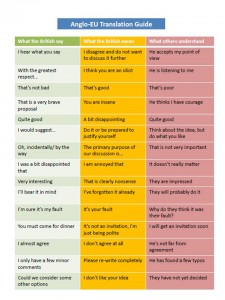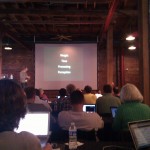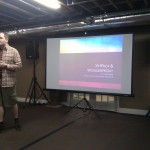Archive for May, 2011
PHP Community Conference
It has been written a lot about PHP Community Conference in Nashville, TN. The conference was definitely worth visiting. It was packed with outstanding PHP developers who were willing to share their knowledge and experience.
This post is mostly for my own records. Thus further reading:
- detailed PHP Community Conference Review by Calvin Froedge.
- slides and summary of major talks byJonathon Hill in Takeaways from PHPCon, day 1 and Takeaways from PHPCon, day 2.
And traditionally a few pictures from the field.
- This is not the venue entrance but shows Nashville atmosphere very well
- Lorna Mitchell on web-services
- Frontend caching explained
- Nashville downtown
- Spaz hackathon in the evening
- Opening keynote by Rasmus Lerdorf
- Paul Reinheimer shared the story of how he built WonderProxy
- Drew McLellan‘s presentation about Perch
Looking forward to PHP Community Conference 2012!
Scaling CouchDB
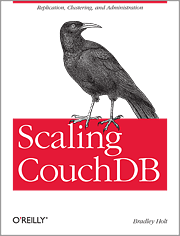
Recently I’ve decided to work further on my writing skills and volunteered to review Bradley Holt’s new book Scaling CouchDB. Especially since I am working on scaling MySQL and playing with MongoDB, I figured it would be a great opportunity to take a look at CouchDB too.
What’s in the book.
- Good introduction on what scaling is and how it is different from high availability
- Extensive overview of major scaling blocks like replication, load balancing and clustering including load testing guide using Tsung.
- Comprehensive examples which actually could work as a CouchDB reference\cookbook. However if there are no plans for detailed review or trying the code, sometimes one may feel like it is not much to read once examples are skipped.
- Great insight on how CouchDB works internally in certain cases. The book does not say ‘just do this’, it also explains how CouchDB processes certain commands internally.
- Valuable warning and recommendation notes as great addition to examples.
Conclusion.
The book is short and really informative reference on scaling CouchDB. Also it is still a good reading with respect to scaling topic for those who are not working with CouchDB but interested in peeking at NoSQL world.
P.S.: I would like to thank Bradley Holt for letting me review his new book and providing an ebook version before the paper one was even printed.
MongoATL Conference
Two month after Meetup with Tom Albers I was able to attend MongoATL Conference. The event was very well organized and really useful and igniting for MongoDB newbies (like myself at that time).
Of course the first thing I did after the conference was installing MongoDB and playing with its native PHP extension. Although I wanted to document that experience Vikram Vaswani had already come up with a great article on Getting Started with MongoDB and PHP.
In addition just a few things to highlight:
- MongoDB is really easy to start with and just works out of the box without any issues. So I was running my first query just a few seconds after it was downloaded.
- Despite the above mongodb.org offers browser shell to try MongoDB out online. So there is a way to play with it even before any download\installation is needed!
- If you are using Windows it is worth checking out a GUI tool MongoVUE which can be a great addition to the command line. Especially it comes really handy if one want to import some test data from MySQL or MS SQL.
- The Little MongoDB Book is a free ebook by Karl Seguin which should help get started with MongoDB as well as answer common questions.
At the end couple pictures from the event via my cell phone. 🙂
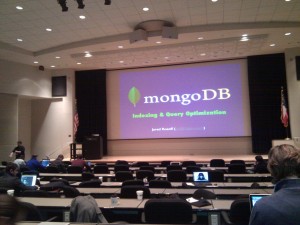
This is before Indexing and Query Optimization talk. It is still a break – that is why it looks empty.

This is bonus picture from GA Tech parking lot where the conference was held.
Meetup with Tom Albers
Back in December I attended a project management meetup with Tom Albers.
While Tom has an impressive list of companies where he was either senior manager or vice president, the most notable and attractive was the fact that he was manager of web development at MySpace.com. It seems like that kind of background allowed him to gather over 100 software developers and project managers.
It was interesting to learn something new from Tom’s experience as well as hear few insights about software development at MySpace. Although many his recommendations overlapped with Rework, I would like to point out two things which are basically must know and follow for anyone who related to managing software development:
- Present the problem, not the solution.
Unfortunately there are so many cases when customers or managers do not trust their software engineers and ask them to implement certain solution without disclosing the problem or saying that it is the only possible solution. But it is not rare when after long discussions it turns out that the initial ‘solution’ is either not that great or even may not solve the problem at all. - If you are not drawing, you are not communicating your team.
Hopefully it is not true anymore but some time ago it was not rare when white boards were considered unnecessary. Also Tom pointed out that a tablet (iPad in his case) works as a perfect tool for communication with remote teams. It takes just seconds to draw something using touchscreen and then share (unlike traditional desktop applications since it take more time to draw using mouse and keyboard).
At the end just couple pictures taken with my cell phone.
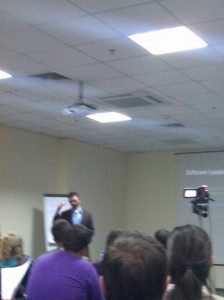
Tom is explaining his vision on who senior developer is.

Coffee-break.
More (and better quality) pictures are posted here.
PHP: IP Address Validation
It’s common to use a regular expression to validate IP addresses.
However I’ve run into couple reliable ways to validate IP address without help of regexps. This should make code cleaner and easier to read or debug in case of any issues.
The first way is to use PHP function filter_var() which returns the filtered data, or false if the filter fails.
$ip = filter_var($ip, FILTER_VALIDATE_IP); if ($ip !== false) { // IP address is valid } |
Note that filter_var() has been supported since PHP 5.2. So it will not work for ‘older’ production environments.
So here comes another way to validate an IP address which should work even for PHP 4.
if (long2ip(ip2long($ip))) == $ip) { // IP address is valid } |
Also fliter_var() unlike ip2long()/long2ip() supports IPv6. For instance, there are four additional flags:
- FILTER_FLAG_IPV4 – allow only IPv4;
- FILTER_FLAG_IPV6 – allow only IPv6;
- FILTER_FLAG_NO_PRIV_RANGE – dot not allow IP from private range;
- FILTER_FLAG_NO_RES_RANGE – do not allow IP from reserved range.
For example, the code to allow only IPv6 not from reserved range should look like this:
$ip = "2a01:e35:aaa4:6860:a5e7:5ba9:965e:cc93"; $ip = filter_var($ip, FILTER_VALIDATE_IP, array( FILTER_FLAG_IPV6, FILTER_FLAG_NO_RES_RANGE)); if ($ip !== false) { // IP address is valid } |
Rework
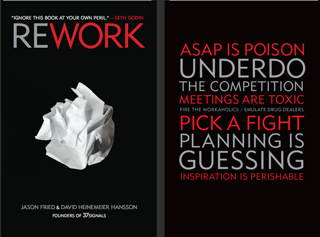
Honestly I was really skeptic while seeing many excited reviews about “Rework” here an there. It all looked like another wave of hype around Ruby on Rails creators. Until a good friend of mine presented me this book.
Although it was collecting dust on my desk for a while, I am finally among those who read this book. 🙂 A-a-and going to join the the group of amazed and ignited readers too.
First of all it is very easy to read this book. Once you have started, you will be turning one page after another without any thoughts to postpone reading. Part of the reason is that the book consists of really small chapters (2-5 pages) and it is always exciting what next chapter brings.
Second, the book is very well supported by examples of real people and companies. Many examples fit great into the book and in certain cases may be even more inspiring than the main story.
Also it is worth pointing out that “Rework” is not 100% unique content. Some things are already known well enough and even becoming mainstream approaches for doing business rather than being sort of unusual (although that does mean that all big companies follow them yet).
However the uniqueness of “Rework” is that all those valuable recommendations, stories and examples gathered in one book and work perfectly not only for inspiration but as a reference book too.
So in my opinion it’s a kind of ‘must read’ book basically for anyone.
In the end a few quotes from the book (in addition to the provocative ones on the back cover).
“A business without a path to profit isn’t a business, it’s a hobby.”
“Teach and you’ll form a bond you just don’t get from traditional marketing tactics.”
“If you want something done, ask the busiest person you know.”
“Easy is a word that’s used to describe other people’s jobs.”
 Comments(0)
Comments(0)